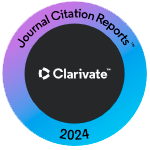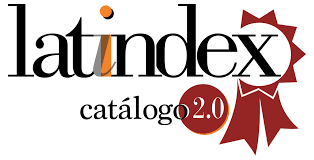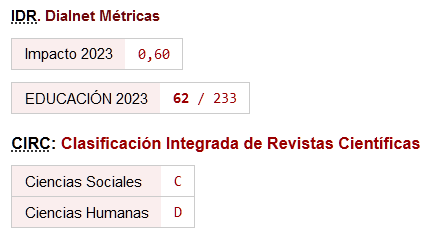La actitud de los estudiantes hacia la biología en las escuelas secundarias de Islamabad, Pakistán
DOI:
https://doi.org/10.46661/ijeri.4711Palabras clave:
Actitud, Escala de actitud de biología, Biología, Educación Secundaria, PakistánResumen
En esta era de la ciencia y la tecnología, el mundo enfrenta desafíos geográficos, mientras que los futuros constructores de naciones están perdiendo su interés incluso en temas de ciencias, especialmente en biología. Existen numerosos factores que contribuyeron al éxito de los estudiantes en un tema en particular, pero el más importante es su actitud hacia ese tema. El objetivo del presente estudio fue investigar la actitud de los estudiantes hacia la biología en las escuelas secundarias de Islamabad. La población de este estudio comprendió a todos los estudiantes de biología de 10º grado en diferentes instituciones en Islamabad. Debido a la escasez de tiempo, el investigador seleccionó a 506 estudiantes (de seis escuelas públicas y cuatro privadas) como muestra de conveniencia para este estudio. Estos estudiantes fueron administrados a través de un instrumento válido y confiable conocido como "Biology Attitude Scale" (BAS) desarrollado por el investigador. El estudio utilizó una escala tipo Likert de 5 puntos para medir la actitud de los estudiantes hacia la biología en siete dimensiones: "Interés en biología", "Carrera en biología", "Importancia de la biología", "Profesor de biología", "Dificultad en biología", "Uso de equipos en biología" y "Metodología de la biología". La actitud de los estudiantes hacia la biología se analizó utilizando el puntaje promedio de una declaración individual. Los resultados del estudio revelaron que los estudiantes en general mostraron una actitud positiva hacia la biología. Las estudiantes exhibieron una actitud positiva en comparación con los estudiantes varones. Del mismo modo, los estudiantes en las escuelas públicas mostraron una actitud positiva hacia los estudiantes de las escuelas privadas.
Descargas
Citas
Al-Shargi, M. (1988). Saudi and non-Saudi Arab Male Students' Attitudes toward Science and Science Achievement in Secondary Schools, Riyadh, Saudi Arabia. (Unpublished doctoral dissertation). Oregon State University, Oregon, USA.
Angell, C., Guttersrud, O., Henriksen, E. K., & Isnes, A. (2004). Physics: Frightful, but fun. Pupils' and teachers' views of physics and physics teaching. Science education, 88(5), 683-706.
Asiri, A.A.M, (2018). Attitude of secondary school students’ in Saudi Arabia towards science. International Journal of Education, Learning and Development, 6(3), 30-36.
Barmby, P., Kind, P. M., & Jones, K. (2008). Examining changing attitudes in secondary school science. International Journal of Science Education, 30(8), 1075-1093.
Bem, D. J. (1970). Beliefs, Attitudes, and Human affairs. Belmont, CA, Brooks/Cole.
Brown, S. J., White, S., Sharma, B., Wakeling, L., Naiker, M., Chandra, S., ... & Bilimoria, V. (2015). Attitude to the Study of Chemistry and Its Relationship with Achievement in an Introductory Undergraduate Course. Journal of the Scholarship of Teaching and Learning, 15(2), 33-41.
Cannon Jr, R. K., & Simpson, R. D. (1985). Relationships among attitude, motivation, and achievement of ability grouped, seventh-grade, life science students. Science Education, 69(2), 121-38.
Chang, S. N., Yeung, Y. Y., & Cheng, M. H. (2009). Ninth graders’ learning interests, life experiences and attitudes towards science & technology. Journal of Science Education and Technology, 18(5), 447-457.
Cheung, D. (2009). Students’ attitudes toward chemistry lessons: the interaction effect between grade level and gender. Research in Science Education, 39(1), 75-91.
Cilenti, K., & Ozcelik, A. (1991). Biology teaching. Eskiuehir: Anadolu University Press.
Dawson, C. (2000). Upper primary boys' and girls' interests in science: have they changed since 1980? International journal of science education, 22(6), 557-570.
Fishbein, M., & Aizen, I. (1975). Belief, attitude, intention, and behavior: An introduction to theory and research. Reading, MA: Addison-Wesley.
Francis, L. J., & Greer, J. E. (1999). Attitude toward science among secondary school pupils in Northern Ireland: Relationship with sex, age and religion. Research in Science & Technological Education, 17(1), 67-74.
Gardner, P. L. (1975). Attitudes to science: a review. Studies in Science Education, 2, 1-41.
George, R. (2006). A cross‐domain analysis of change in students’ attitudes toward science and attitudes about the utility of science. International Journal of Science Education, 28(6), 571-589.
Greenfield, T. A. (1996). Gender, ethnicity, science achievement, and attitudes. Journal of Research in Science Teaching, 33(8), 901-933.
Hussaini, I., Foong, L. M., & Kamar, Y. (2015). Attitudes of secondary school students towards biology as a school subject in Birnin kebbi Metropolis, Nigeria. International Journal of Research & Review, 2(10), 596-600.
Jebson, S. R., & Hena, A. Z. (2015). Students’ attitude towards science subjects in senior secondary schools in Adamawa State, Nigeria. IMPACT: International Journal of Research in Applied, Natural and Social Sciences, 3(3), 117-124.
Jones, M. G., Howe, A., & Rua, M. J. (2000). Gender differences in students' experiences, interests, and attitudes toward science and scientists. Science Education, 84(2), 180-192.
Joyce, B. A., & Farenga, S. J. (2000). Young girls in science: Academic ability, perceptions, and future participation in science. Roper Review, 22(4), 261-262.
Keeves J., & Kotte, D. (1992). Disparities between the sexes in science education: 1970-84. In J. Keeves (Ed.), The IEA study of science III (pp. 141-164). New York: Pergamon.
Khan, G. N., & Ali, A. (2012). Higher secondary school students' attitude towards chemistry. Asian Social Science, 8(6), 165.
Koballa Jr, T. R., & Crawley, F. E. (1985). The influence of attitude on science teaching and learning. School Science and Mathematics, 85(3), 222-232.
Koballa, E. R. Jr., Crawley, F. E., & Shrigley, R. L. (1990). A summary of science education-1988. Science Education, 74(3), 253-256.
Laforgia, J. (1988). The Affective Domain Related to Science Education and Its Evaluation. Science Education, 72(4), 407-21.
Linn, M. C. (1992). Science education reform: Building on the research base. Journal of Research in Science Teaching, 29(8), 821-840.
Mavrikaki, E., Koumparou, H., Kyriakoudi, M., Papacharalampous, I., & Trimandili, M. (2012). Greek Secondary School Students' Views about Biology. International Journal of Environmental and Science Education, 7(2), 217-232.
MdZain, N., Samsudin, M., Rohandi, R. & Jusoh, A. (2010). Improving Students’ Attitudes Toward Science Using Instructional Congruence. Journal of Science and Mathematics, 33(1), 39-64.
Muellerleile. J. (2005). Attitude vs. Aptitude. http://www.4vqp.com/images/062305_Attit ude_vs_Aptitude.pdf
Nasr, A. R., & Soltani, A. K. (2011). Attitude towards biology and its effects on student's achievement. International Journal of Biology, 3(4), 100.
O'Brien, J., & Porter, G. C. (1994). Girls and physical science: the impact of a scheme of intervention projects on girls' attitudes to physics. International Journal of Science Education, 16(3), 327-341.
Oliver, J. S., & Simpson, R. D. (1988). Influences of attitude toward science, achievement motivation, and science self-concept on achievement in science: A longitudinal study. Science Education, 72(2), 143-155.
Osborne, J., Simon, S., & Collins, S. (2003). Attitudes towards science: A review of the literature and its implications. International journal of science education, 25(9), 1049-1079.
Oskamp, S., & Schultz, P. W. (2005). Attitudes and opinions (3rd ed.). Mahwah, NJ: Lawrence Erlbaum Associates.
Papanastasiou, E. C., & Zembylas, M. (2002). The effect of attitudes on science achievement: A study conducted among high school pupils in Cyprus. International Review of Education, 48(6), 469-484.
Pell, T., & Jarvis, T. (2001). Developing attitude to science scales for use with children of ages from five to eleven years. International Journal of Science Education, 23(8), 847-862.
Prokop, P., Prokop, M., & Tunnicliffe, S. D. (2007a). Is biology boring? Student attitudes toward biology. Journal of Biological Education, 42(1), 36-39.
Prokop, P., Tuncer, G., Chudá, J. (2007b). Slovakian students’ attitude toward biology. Eurasia Journal of Mathematics, Science & Technology Education, 3(4), 287-295.
Ramsden, J. M. (1998). Mission impossible? Can anything be done about attitudes to science? International Journal of Science Education, 20(2), 125-137.
Rana, R. A. (2002). Effect of parents, socioeconomic status, students, self-concept and gender on science-related attitudes and achievement (Doctoral Thesis). Institute of Education and Research, University of the Punjab, Lahore.
Rani, G. (2000). Measuring Change in Students' Attitudes Toward Science Over Time: An Application of Latent Variable Growth Modeling. Journal of Science Education and Technology, 9(3), 213-225.
Saif, A. & Aseri, A. (2017). Attitudes of Elementary Schools Students in Najran District towards Science. Journal of education and practice. 8(27), 231-231.
Sakariyau, A. O., Taiwo, M. O., & Ajagbe, O. W. (2016). An Investigation on Secondary School Students' Attitude towards Science in Ogun State, Nigeria. Journal of Education and Practice, 7(28), 125-128.
Salta, K., & Tzougraki, C. (2004). Attitudes toward chemistry among 11th grade students in high schools in Greece. Science Education, 88(4), 535-547.
Schibeci, R. A., & Riley, J. P. (1986). Influence of students' background and perceptions on science attitudes and achievement. Journal of Research in Science Teaching, 23(3), 177-187.
Simpson, R. D., & Steve Oliver, J. (1990). A summary of major influences on attitude toward and achievement in science among adolescent students. Science Education, 74(1), 1-18.
Sitotaw, B., & Tadele, K. (2016). Students attitudes towards physics in primary and secondary schools of Dire Dawa City administration, Ethiopia. World Journal of Educational Research and Reviews, 2(2), 014-021.
Soltani, A., & Nasr, A. (2010). Attitude towards Biology and its Effects on Student’s Achievement. Paper presented at the 2nd Paris International Conference on Education, Economy and Society – 2010.
Spall, K., Barrett, S., Stanisstreet, M., Dickson, D., & Boyes, E. (2003). Undergraduates' views about biology and physics. Research in Science & Technological Education, 21(2), 193-208.
Spall, K., Stanisstreet, M., Dickson, D., & Boyes, E. (2004). Development of school students' constructions of biology and physics. International Journal of Science Education, 26(7), 787-803.
Sulun, A., Gurbuz, H., & Kandemir, A. (2004). Emergin Biology Culture in Turkish Educational System. Hacettepe University Journal of Education, 26, 160-166.
Thurstone, L. L. (1931). The measurement of social attitudes. The Journal of Abnormal and Social Psychology, 26(3), 249-269.
Trumper, R. (2006). Factors affecting junior high school students’ interest in biology. Science Education International, 17(1), 31-48.
Usak, M., Prokop, P., Ozden, M., Ozel, M., Bilen, K., & Erdogan, M. (2009). Turkish University Students ‘attitudes Toward Biology: The Effects of Gender and Enrolment in Biology Classes. Journal of Baltic Science Education, 8(2), 88-96.
Weinburgh, M. (1995). Gender differences in student attitudes toward science: A meta‐analysis of the literature from 1970 to 1991. Journal of Research in science Teaching, 32(4), 387-398.
White, E. L., & Harrison, T. G. (2012). UK School Students' Attitudes towards Science and Potential Science-Based Careers. Acta Didactica Napocensia, 5(4), 1-10.
Willson, V. L. (1983). A meta‐analysis of the relationship between science achievement and science attitude: Kindergarten through college. Journal of research in Science Teaching, 20(9), 839-850.
Yousuf, A., & Bhutta, S. (2012). Secondary school students‟ attitude towards environmental issues in Karachi Pakistan. Journal of Educational and Social Research, 2(10), 154-165.
Yunus, F. W., & Ali, Z. M. (2013). Attitude towards learning chemistry among secondary school students in Malaysia. Journal of Asian Behavioural Attitude, 3(11), 1-12.
Descargas
Publicado
Cómo citar
Número
Sección
Licencia
Derechos de autor 2022 Shahzad Ahmad, Naveed Sultana, Sadia Jamil

Esta obra está bajo una licencia internacional Creative Commons Atribución-NoComercial-SinDerivadas 4.0.












